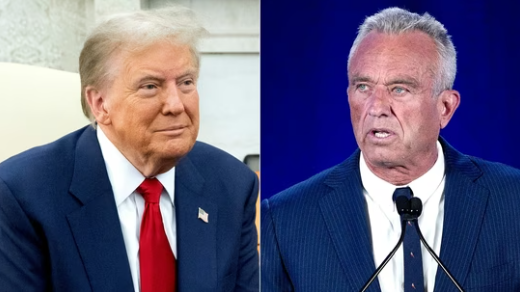In a move stirring widespread controversy, US President-elect Donald Trump announced plans to engage in discussions with Robert F. Kennedy Jr., his nominee to head the Department of Health and Human Services (HHS), about potentially ending certain childhood vaccination programs. The discussions stem from debunked claims suggesting a link between vaccines and autism, an idea long dismissed by the scientific community.
Trump, in an interview published on Thursday, expressed his respect for Kennedy’s views on vaccinations. “We’re going to have a big discussion. The autism rate is at a level that nobody ever believed possible,” Trump told Time magazine. He further added, “If I think certain vaccines are dangerous or not beneficial, we could see changes, though I don’t believe it will be very controversial in the end.”
Controversial Theories Resurface
Kennedy, a vocal critic of vaccine mandates, has consistently raised doubts about vaccine safety, citing debunked theories linking vaccinations to autism. He has also criticized state and federal COVID-19 restrictions. Despite widespread scientific consensus discrediting these claims, Kennedy remains a polarizing figure in the vaccine debate.
Trump echoed Kennedy’s concerns, suggesting that current vaccination practices could be contributing to rising autism rates. “At the end of the studies that we’re doing, we’re going to know what’s good and what’s not,” Trump said, reaffirming his openness to reevaluating vaccination policies.
Scientific Consensus vs. Public Perception
The scientific community has repeatedly debunked the alleged vaccine-autism link. A 1998 study by Andrew Wakefield, which initially fueled these claims, was retracted, and its findings have been thoroughly discredited. Subsequent research, including a 2014 meta-analysis involving over 1.2 million children, found no evidence of a connection between vaccines and autism.
Autism Speaks, a prominent advocacy group, stated, “We remain aligned with the scientific consensus, which confirms that vaccines do not cause autism.” Experts warn that undermining vaccination programs could lead to outbreaks of preventable diseases like measles. Former FDA commissioner Scott Gottlieb cautioned, “For every 1,000 cases of measles in children, there will be one death. Reducing vaccination rates will cost lives.”
Policy Implications
If confirmed as HHS secretary, Kennedy would oversee the Centers for Disease Control and Prevention (CDC), which determines vaccination guidelines and administers programs like Vaccines for Children, providing free immunizations to eligible children. His leadership could mark a significant shift in US public health policy.
While Trump acknowledged the importance of some vaccines, he suggested that a thorough review was necessary. “Certain vaccines are incredible, but maybe some aren’t. We have to find out,” he remarked during a recent interview on Meet the Press.
A Divided Public Response
Trump’s statements have reignited debates over vaccination, with critics warning that such discussions could erode public trust in essential health measures. Supporters argue that exploring vaccine safety reflects a commitment to transparency.
As the Trump administration prepares to take office, these discussions are expected to have significant implications for the nation’s public health landscape.








 India
India












